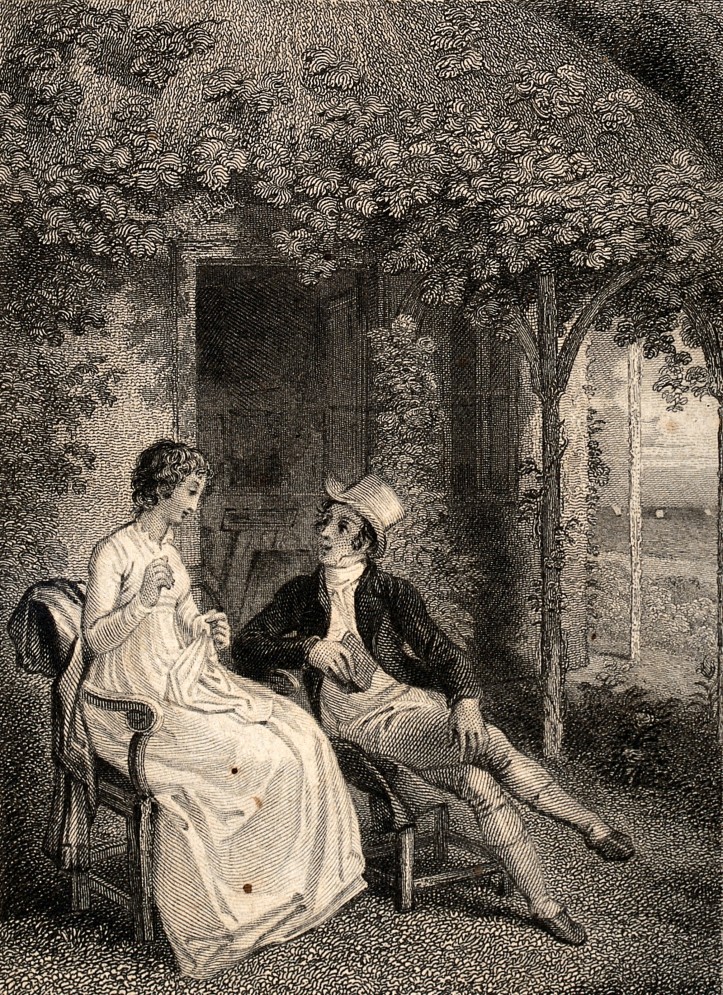Fallen is told exclusively from Elizabeth Bennet’s point of view, but personally, when I read a book, especially Pride and Prejudice, I love to imagine what the other characters are thinking, and to try to imagine their motivations. With that in mind, I’ve written this extra scene, told from Charlotte Collins’ point of view at around the mid-point of the story, where we see her begin to formulate some of her match-making ideas. Whether she’s read the situation quite right or not, I’ll leave for you to decide!

Charlotte Collins poured herself another cup of tea and sat back, waiting for her guest to resume the conversation. Thus far, he had seemed more than commonly eager to ask her about her connexions in Meryton, but she had a burning suspicion that it was neither her family nor her home in which he was truly interested.
“And so tell me,” he said, leaning back in his chair and crossing his legs, “do you find the society in Hunsford to your liking? Are your neighbours as friendly as they were in Hertfordshire?”
“Well, I did not keep quite the same company there as my husband and I enjoy here, but my family had a good many friends nearby.” He regarded her expectantly, and she could not resist withholding just a little, to see how he would act. “The Gouldings, for instance. They were always exceedingly sociable. And the Longs.”
He was not to be put off. “I thought I understood that you were a particular friend of Miss Bennet’s?”
Charlotte grinned to herself. There! “Oh yes, Eliza and I have always been very close. Indeed, we still are.”
He nodded solemnly. “She seems a very sensible young woman.”
Certainly sensible enough for the son of an earl, she thought with glee. “She is, Colonel, eminently so. Perhaps not quite as perfectly indifferent to romantic notions as I, but she has nevertheless always been sensible of her situation in life and therefore her prospects. Though, I am sure some would agree she has talents that more than compensate for any want of consequence.”
Her companion nodded again, his countenance pensive. “She has three younger sisters, I collect.”
“And one older.”
“Pray, what are their names?”
It was a strange question, and Charlotte hoped her confusion was not obvious as she answered. “Mary, Kitty—Catherine, I should say—and Lydia.” Had he heard something unfavourable about them? “They are very good girls,” she added, just in case.
“Are they much younger than Miss Elizabeth?”
Perhaps Mr Darcy had warned him of Lydia or Kitty’s wild behaviour. Poor Elizabeth, to be judged on the conduct of two such silly girls! “The youngest is not yet sixteen.”
“Ah. Not terribly young, then. But is Miss Bennet much in the company of other children, do you know? I have heard young ladies enjoy such society.”
Again, Charlotte schooled her expression as she attempted to guess, and guess again, at the colonel’s purpose. An enquiry about a woman’s fondness for children was an altogether more intimate sort of inquisition than one about her connexions. “I know she is exceedingly fond of her cousins, who are aged between four and ten. And she was wonderfully patient with my own siblings when they were younger. Are you fond of children yourself, sir?”
“Me? Not particularly. With a very few exceptions, I find them noisy, tiresome creatures. But my cousin is more disposed to like them.”
“Miss de Bourgh?”
“Darcy. Miss Bennet’s cousins, do they live in Hertfordshire?”
Charlotte took a moment to respond, her mind engaged in hastily recalculating all her assumptions. “No, in London. Mr Darcy has an obligation to be interested in children, I suppose.”
Colonel Fitzwilliam’s gaze sharpened, and he shifted in his seat. “Have you any reason to suppose that?”
“Will not he one day require an heir?”
“Oh. Yes, quite.”
And for that, he will require a wife… “I imagine, if he enjoys the company of children, he would prefer a sportive wife, for they would both afford him a measure of liveliness, if that is what pleases him.”
Colonel Fitzwilliam’s countenance drew into a look of intense deliberation, though his answer made it apparent he had not been concentrating on what Charlotte had said. “Has Miss Bennet mentioned that there were any newcomers to the neighbourhood? Before she came here, that is.”
“There were a plethora of newcomers last autumn, sir—your cousin among them.”
“Yes, yes, of course. But I mean apart from Darcy and Bingley. A neighbourhood such as you have described can have but few people coming and going in the usual course of things. New ones must be noticeable. Did Miss Bennet ever mention making any new acquaintances outside of my cousin’s party?”
Being already resolved to discover some proof of regard for her friend from one gentleman or the other, Charlotte leapt to construe the rationale for this query before the good colonel had even finished voicing it. And her conclusion was that Elizabeth would have to eat her words, for despite her every protest to the contrary, Mr Darcy evidently was in love with her, if he had sent his cousin to discover whether she had any other suitors before he made his addresses. “She has never mentioned anybody to me specifically,” she replied. Then, recalling that Mr Darcy had once refused to dance with Elizabeth on account of her having been slighted by other men, she added, “But she has ever been well-liked and is exceedingly sociable. If somebody new had come into the neighbourhood, it would not surprise me at all if she had befriended them.”
“Yet you say she made no mention of any specific person?”
He seemed so sincere that Charlotte wondered whether he had somebody particular in mind. Yet much had happened in her life over the past six months; she would be hard pushed to recall every new acquaintance of her own, let alone every one of her friend’s. “None that I can recall. Well, there was the militia, of course, but—” She stopped speaking abruptly upon recalling that amongst the officers had been one very particular gentleman, whose mention was not likely to be well received by the colonel: Lieutenant Wickham, who, if her suspicions were correct, had a most unwelcome connexion to Mr Darcy. She wished she had not mentioned it, for it would scarcely recommend Elizabeth if it appeared there was any partiality on her side for a man whom Mr Darcy had such good cause to despise. “But they are gone from Meryton now, and I do not think they will be missed by anybody.”
“I am certain you are right, madam,” the colonel replied coldly. “But it was not the likes of Colonel Fortser’s men to whom I was referring.”
Then I am quite sure I have no idea to whom you are referring, thought Charlotte in exasperation. “In that case, I am afraid I cannot offer any further enlightenment, sir. Might I enquire whether Mr Darcy plans to return to Netherfield at all?” she enquired, of the mind that if that gentleman wished to know with whom Elizabeth kept company, he ought to return himself and find out first-hand.
“Almost certainly not,” replied the colonel, apparently somewhat disgusted by the notion if his expression were any indication.
“I see,” she replied innocently. “Whatever can his interest in my friend’s neighbours be then?”
He lifted his eyes to hers in alarm. “He is not—I am—this is not—” Observably collecting himself, he began again. “I am not privy to my cousin’s plans, Mrs Collins. I was interested in Meryton because you made it sound such an appealing place. I thank you for sharing your stories with me. Perhaps, on my next call, I shall regale you with tales of Matlock, where I grew up.”
Charlotte agreed that she should like that very well, and her visitor departed with uncharacteristic awkwardness. Afterwards, she pulled the bell and for Jenny to come and take away the tea things and then sat on the settee, smiling to herself. She would say nothing to Elizabeth. If her obstinate friend were aware of Mr Darcy’s vicarious investigations, she would almost certainly evade the alliance simply to avoid being proved wrong. Oh, how Charlotte hoped it would come to something, though! And that Elizabeth would not be such a fool as to refuse this offer as she had the last, for as Mr Collins often said, it was by no means certain that she would ever receive another.
***
Colonel Fitzwilliam walked away from the parsonage deep in thought. He had discovered nothing more about Miss Bennet’s connexion to Anna, though he had pursued every line of questioning conceivable barring a direct demand for answers. Even if Darcy’s suspicions were correct, Miss Bennet certainly did not appear to have confided anything about it to Mrs Collins, and he remained no better informed than he had been before the tortuous interview. If he was to fulfil his promise to Darcy to uncover the truth, he must talk to Miss Elizabeth Bennet directly, to see what he could glean from her on the matter.

I haven’t got round to reading this one yet but I do hope I can remember this extra scene when I do read it! I’m very curious about Anna myself!
Thank you for sharing!
LikeLiked by 1 person